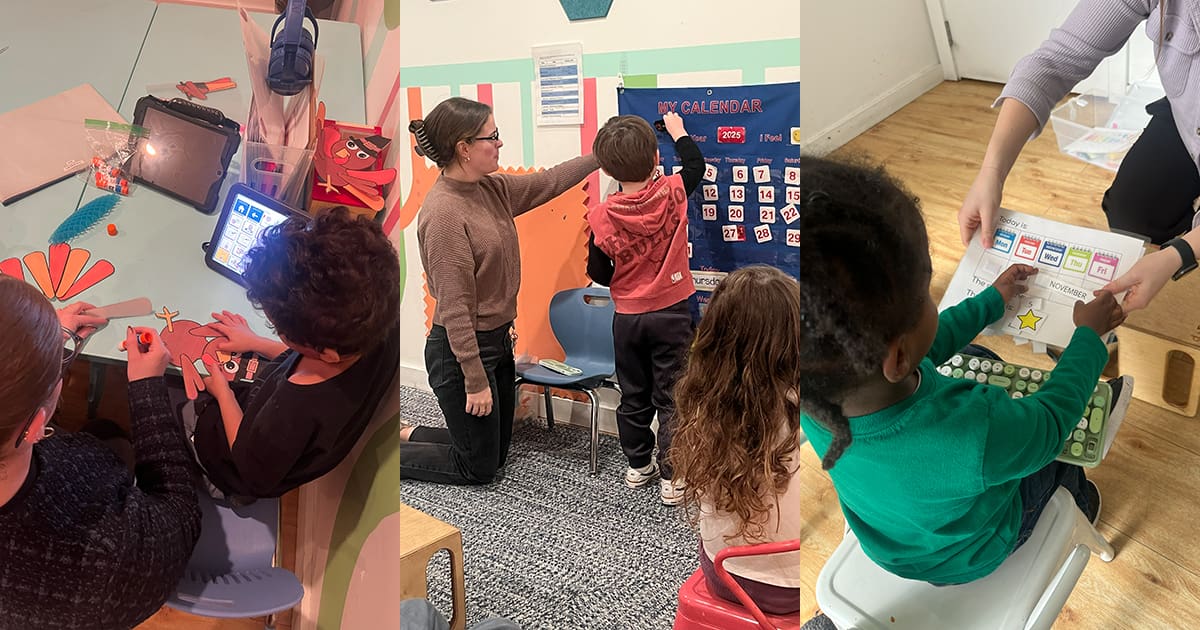Share this Post

When a child experiences speech or language delays, parents often wonder what they can do to support their child’s progress. While speech therapy with a licensed speech-language pathologist is essential, research shows that family involvement plays an equally important role in helping children develop strong communication skills.
At CST Academy, we believe that parents and caregivers are a vital part of the speech therapy journey. The work done in therapy sessions is just one piece of the puzzle. By reinforcing speech and language strategies at home, parents can help their child build confidence, improve communication, and make faster progress.
Why Family Involvement Matters in Speech Therapy
Speech therapy does not stop when the session ends. The most significant progress happens when children consistently practice communication skills throughout their daily routines. Parents and caregivers serve as a child’s first and most important teachers, providing frequent opportunities to strengthen speech and language skills in real-life settings.
When families are involved in speech therapy, children benefit in multiple ways:
- They receive daily reinforcement of the skills they learn in therapy.
- They gain confidence in using new communication techniques at home and in social settings.
- They feel supported and encouraged, reducing frustration and anxiety about speech difficulties.
- They develop a stronger bond with their caregivers through meaningful communication interactions.
By actively participating in the speech therapy process, parents can help create an environment where communication is encouraged and celebrated.
Ways Families Can Support Speech Therapy at Home
1. Create a Language-Rich Home Environment
Children learn best through exposure and interaction. A language-rich home environment provides constant opportunities for children to hear, process, and use language naturally.
Parents can encourage language development by:
- Narrating daily activities such as cooking, getting dressed, or playing outside.
- Reading books together and asking open-ended questions about the story.
- Singing songs and nursery rhymes to build rhythm and vocabulary.
- Expanding on what their child says by adding more words and details to the conversation.
The more language children are exposed to, the more opportunities they have to strengthen their speech and communication skills.
2. Practice Speech and Language Goals in Everyday Routines
Speech therapy exercises do not need to feel like work. Parents can incorporate speech and language practice into their child’s daily routines in fun and engaging ways.
For example:
- Encourage turn-taking and conversation during mealtime.
- Play games that involve following directions, such as Simon Says or scavenger hunts.
- Use car rides as an opportunity to name objects, describe what you see, or practice storytelling.
- Model correct speech sounds in a natural and supportive way.
By integrating speech therapy techniques into daily activities, children get frequent, low-pressure practice in real-life situations.
3. Use Positive Reinforcement and Encouragement
Children thrive on encouragement. Positive reinforcement helps build confidence and motivation to continue practicing their speech and language skills.
Parents can support their child’s communication by:
- Celebrating their efforts, not just their successes.
- Offering praise when they try new words or sounds.
- Avoiding corrections that may cause frustration or discouragement.
- Focusing on what their child is saying, rather than how they are saying it.
The goal is to create a safe and encouraging environment where children feel comfortable communicating, even if their speech is not yet perfect.
4. Communicate with the Speech Therapist Regularly
Speech therapy is most effective when there is open communication between families and therapists. Parents should work closely with their child’s speech therapist to stay informed about progress, challenges, and techniques they can use at home.
Ways to stay involved include:
- Attending speech therapy sessions whenever possible.
- Asking the therapist for specific activities to practice at home.
- Sharing observations about improvements or difficulties.
- Setting goals together to ensure consistency between therapy and home practice.
Collaboration between families and therapists leads to better outcomes and a more seamless learning experience for the child.
5. Be Patient and Make It Fun
Speech development takes time, and every child progresses at their own pace. Parents should approach speech therapy with patience and a positive attitude, ensuring that practice feels fun rather than stressful.
Some ways to keep speech practice engaging include:
- Turning speech exercises into games and playful activities.
- Using toys, puppets, or apps to make learning interactive.
- Encouraging creative storytelling and imaginative play.
- Keeping sessions short and enjoyable to prevent frustration.
When children associate speech practice with fun and connection, they are more likely to stay engaged and motivated.
The Role of Siblings and Extended Family
Family involvement in speech therapy goes beyond parents. Siblings, grandparents, and other caregivers can also play a meaningful role in supporting a child’s communication development.
Siblings can:
- Model correct speech sounds and sentence structures.
- Engage in interactive play that encourages language use.
- Provide opportunities for natural conversation and peer interaction.
Grandparents and other family members can:
- Read stories aloud to encourage listening and comprehension.
- Participate in simple games that promote language skills.
- Reinforce the same speech therapy techniques used at home.
When the entire family works together to support speech and language development, children receive a well-rounded and consistent approach to learning.
Building Confidence and Lifelong Communication Skills
Speech therapy is not just about improving pronunciation or increasing vocabulary—it is about helping children gain the confidence to express themselves, connect with others, and develop strong communication skills that will benefit them for a lifetime.
At CST Academy, we recognize the power of family involvement in speech therapy. Our therapists work closely with parents and caregivers to provide the tools, strategies, and guidance needed to support each child’s unique communication journey.
If you have questions about your child’s speech development or would like to learn more about how family involvement can enhance therapy progress, contact CST Academy today. Together, we can help your child reach their full communication potential in a warm and supportive environment.
Discover Our Pediatric Therapy & Autism Care
ABA Therapy
Support for children with autism.
Autism Evaluation
Expert assessments to identify child needs.
Pediatric Therapy Services
Speech, Occupational, Feeding, and Physical Therapy.
Therapeutic Preschool
A classroom environment designed for early learners with unique needs.

Find the Best Care for Your Child




